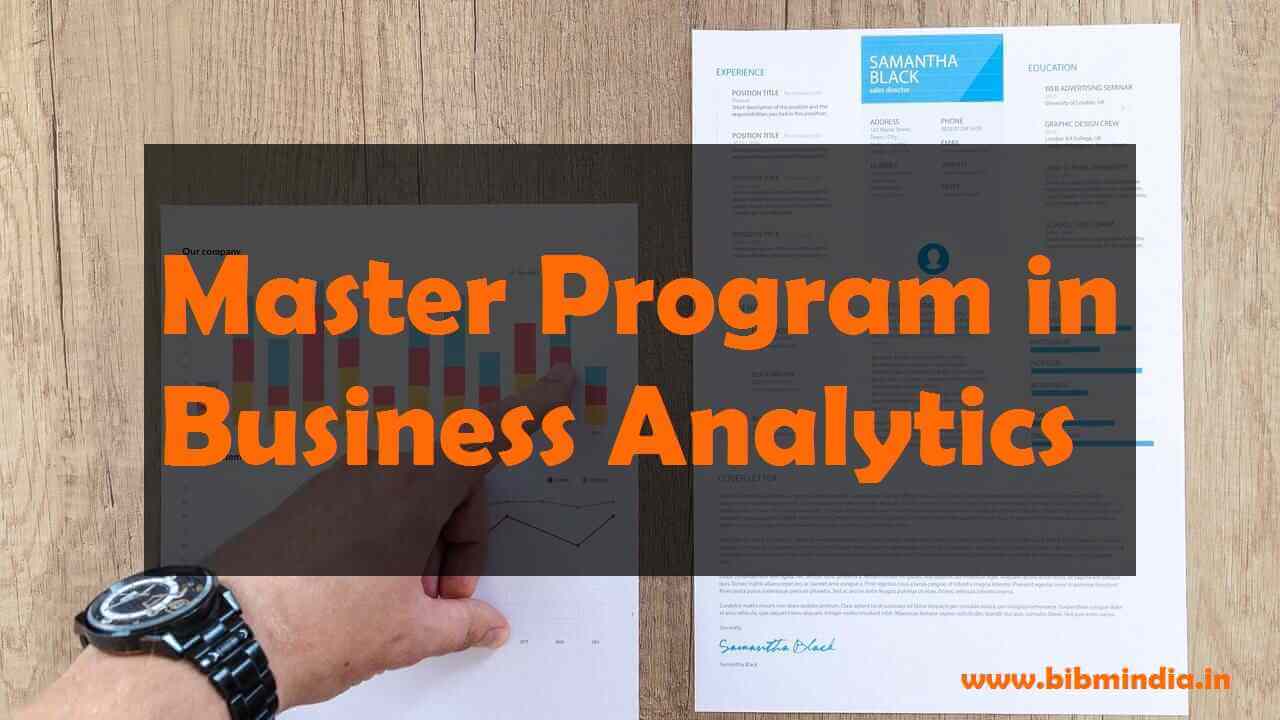Master Program in Business Analytics
Business analytics is the practice of turning data into insights that inform business decisions. It’s about using data to understand what’s happening, why it’s happening and what can be done to improve things.
The demand for business analytics skills is growing highly. By 2020, there will be a 28% increase in the demand for professionals in business analytics, according to a recent IBM study.
If you’re interested in a career in business analytics, a master program in business analytics can give you the skills you need to be successful. In this article, we’ll discuss the master program in business analytics at the BIBM institute.
The BIBM institute’s master program in business analytics is a one-year, full-time program that offers a comprehensive curriculum in business analytics. The program is designed for professionals with previous experience who wish to improve their data analysis abilities.
The program begins with a foundation in analytics, statistics and programming. Students then move on to advanced coursework in areas such as machine learning, optimization and big data. The program concludes with a capstone project in which students apply their knowledge to a real-world business issue.
The program’s faculty includes some of the world’s leading experts in business analytics. The program is also home to the Center for Analytics and Insights which is a research center that develops new methods and tools for data-driven decision-making.
If you’re looking for a master program in business analytics that will give you the skills you need to be a successful business analyst, this program is a great option. To keep this in mind BIBM institute offer this course cause the job market for business analytics professionals is expected to grow significantly in the coming years as organizations increasingly rely on data to make decisions.
There are a variety of different subjects that can be studied within business analytics, including:
- Data mining
- Predictive modeling
- Machine learning
- Business intelligence
- Operations research
Data mining is the process of mining valuable information from large data sets. This information can be used to make predictions about future trends and patterns.
Predictive modeling is a method for building models that can be used to predict what will happen in the future. This is typically done by analyzing past data to identify patterns that can be used to predict future outcomes.
Machine learning is a branch or subfield of artificial intelligence that deals with the creation of algorithms that can learn from data. This is a powerful tool that can be used to make predictions about future events.
Business intelligence is the process of gathering, storing, and analyzing data to support decision making. This can be done through a variety of methods, such as data warehousing, data mining and OLAP.
Operations research is a scientific approach to decision making that deals with the identification and solution of complex problems. This subject often uses mathematical modeling and optimization techniques to find the best solution to a problem.
You can save up to 40% in tuition fee if enroll now
Eligibility & Course Access Duration
Fresh Graduates/Diploma in any discipline or equivalent with minimum 1 Year of working Professional with course duration of 1 Year.
Features:
- 100% Online
- Availability of no cost EMI plan
- Dual Specializations
- 24/7 Online support
- Asynchronous learning allowing you to learn on your own time
- No conditions and no GMAT or CAT examination required
- Affordable Fee Structure.
Career options or jobs after Master Program in Business Analytics
The job market for business analytics professionals is growing rapidly. Companies are increasingly collecting data on their customers, operations, and financial performance, and they need people who can help them make sense of it all.
Business analytics jobs are typically divided into three categories: data analysts, who collect and organize data; business intelligence analysts, who analyze data to identify trends and insights and data scientists, who use advanced statistical techniques to develop predictive models.
Data analysts are in high demand, as they are the foundation of any business analytics team. They collect data from a variety of sources, including customer surveys, financial reports, and social media, and organize it into a format that can be analyzed. Data analysts typically have a background in computer science, statistics or mathematics.
Business intelligence analysts use data to identify trends and insights that can help a company improve its performance. They work closely with data scientists to develop predictive models, and they also provide information that can assist decision-makers in making better choices. Business intelligence analysts typically have a background in business, economics, or statistics.
Data scientists are the most in-demand business analytics professionals. They use advanced statistical techniques to develop predictive models that can help a company anticipate future trends. Data scientists typically have a background in mathematics, statistics, computer science or engineering.



